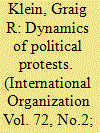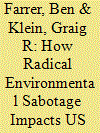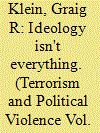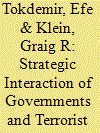|
|
|
Sort Order |
|
|
|
Items / Page
|
|
|
|
|
|
|
| Srl | Item |
| 1 |
ID:
160342


|
|
|
|
|
| Summary/Abstract |
The links between protests and state responses have taken on increased visibility in light of the Arab Spring movements. But we still have unanswered questions about the relationship between protest behaviors and responses by the state. We frame this in terms of concession and disruption costs. Costs are typically defined as government behaviors that impede dissidents’ capacity for collective action. We change this causal arrow and hypothesize how dissidents can generate costs that structure the government's response to a protest. By disaggregating costs along dimensions of concession and disruption we extend our understanding of protest behaviors and the conditions under which they are more (or less) effective. Utilizing a new cross-national protest-event data set, we test our theoretical expectations against protests from 1990 to 2014 and find that when protesters generate high concession costs, the state responds in a coercive manner. Conversely, high disruption costs encourage the state to accommodate demands. Our research provides substantial insights and inferences about the dynamics of government response to protest.
|
|
|
|
|
|
|
|
|
|
|
|
|
|
|
|
| 2 |
ID:
188029


|
|
|
|
|
| Summary/Abstract |
In this paper we examine the impact of forceful or violent environmental sabotage (FVES) on U.S. elections. We argue that voters see ideological similarities between groups that engage in FVES and other nonviolent environmental organizations, like the Green Party. This means that when an environmentalist organization engages in FVES, it has a negative impact on voter attitudes toward all environmental organizations. Moreover, this negative impact will be stronger if environmentalists had previously made electoral progress, and so they cannot use the excuse that democratic methods had failed and they were forced to turn to FVES. We demonstrate this by showing that when FVES occurs, Green Party candidates tend to win a lower share of the vote in the next election. However, this effect is conditional on the prior electoral history of the Green Party. If the Green Party has a poor electoral record, then sabotage has little effect, but if the Green Party has a better electoral record, then voters are less forgiving of sabotage. We find no evidence that FVES effects Republican or Democratic vote shares. We conclude that different organizations within the same social movement are connected in ways that impact electoral outcomes.
|
|
|
|
|
|
|
|
|
|
|
|
|
|
|
|
| 3 |
ID:
148933


|
|
|
|
|
| Summary/Abstract |
In the current literature, the primary determinants of terrorist attack casualty rates have been attributed to religious fundamentalism. While zealotry, martyrdom, and the pursuit of salvation certainly empower religious fundamentalists with the liberty to decimate human targets, I argue that the sustaining necessity to recruit more terrorists from within the population, not religious fundamentalism alone, is an important predictor of the brutality of an attack. When targets are located within a potential recruitment population, there is an imminent need to restrict violence, as unnecessary collateral damage turns potential supporters away, rather than attracts them. Conversely, transnational attacks occurring outside the recruitment population abrogate these restrictions on violence. I test this argument on terrorist attacks from 1998–2005 and find empirical evidence that transnational attacks are a predictive cause of high casualty rates in a target population.
|
|
|
|
|
|
|
|
|
|
|
|
|
|
|
|
| 4 |
ID:
182543


|
|
|
|
|
| Summary/Abstract |
When governments’ ability to maintain power is threatened, they use any tool at their disposal to re-establish or boost their survival. In this paper, we theorize dyadic strategic choices and interactions between governments and domestic terrorist groups in times of economic turmoil. We contend that governments are more likely to increase their targeting of domestic terrorist groups, which provides legitimate opportunities to divert public attention from economic concerns and rally individuals around the flag. Meanwhile, observing such incentives, domestic terrorist groups make strategic decisions similar to those of interstate actors by either decreasing their attacks (strategic conflict avoidance) or increasing them (strategic conflict seeking) to add an inability to provide safety and security to the government’s existing struggles. We test these competing hypotheses by leveraging two recently released event datasets focusing on the Turkey-PKK conflict. Our findings contribute to the terrorism studies literature on decision-making and strategic choices, and broader scholarship about conflict processes by testing conflict dynamics at the domestic level.
|
|
|
|
|
|
|
|
|
|
|
|
|
|
|
|
|
|
|
|
|